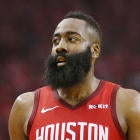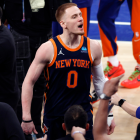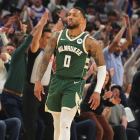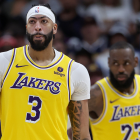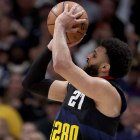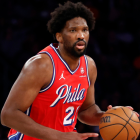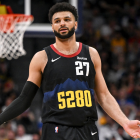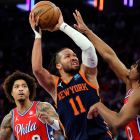Suffice it to say, the Houston Rockets were not pleased with the officiating in their 104-100 Game 1 loss to the Golden State Warriors on Sunday. After the game, James Harden said he just wants a "fair chance" and called on the officials to simply "call the game how it's supposed to be called." Harden, of course, was referring to the multiple 3-point attempts on which he thought he was fouled, but that went uncalled, four of which Mike D'Antoni said the officials admitted were missed at halftime.
According to the count from their video crew, the Rockets, as reported by The Athletic, think they were actually fouled on eight 3-point attempts that went uncalled. If accurate, that's 24 free throws in a four-point game. Golden State predictably scoffed at the Rockets' suggestion of officiating inequity, saying there were plenty of calls that went against them as well, as is the nature of any NBA game. But the Rockets don't think this is the first time the Warriors have received the benefit of a one-sided whistle.
As reported on Monday by ESPN's Zach Lowe and Rachel Nichols, the Rockets believe faulty officiating cost them a win over the Warriors in Game 7 of last year's Western Conference finals, and ultimately cost them an NBA championship. Using video provided by the NBA, which highlighted 81 potential missed calls/non-calls from that Game 7, the Rockets, through their own interpretations of the rulings, concluded they were on the wrong side of a disproportionate amount of those calls, which by their calculations cost them 18.6 points in a game Golden State won by nine. They filed a report to the league with their findings. Per ESPN, the league did not "agree with [the Rockets'] methodologies."
So that's the gist. The Rockets believe they got jobbed in Game 1, same as they got jobbed in Game 7 last year, and they've made their frustrations, which are bubbling toward full-on anger, publicly known. They've gone to the league office. They've griped at press conferences. And while a greater discussion, perhaps this offseason, is certainly warranted about "landing spots" and a player in Harden who has spent years blurring the line between what is and isn't a foul, right now there is only one question that matters: Will all the lobbying work?
"I can definitely see Houston getting a greater benefit of the doubt [in Game 2]," a league exec told CBS Sports. "With these bang-bang judgment calls, that's all you're really talking about. They can go either way. Maybe a guy like Harden loses some credibility when you see all the flailing and kicking his legs out and what not, but personally I don't think that was really the case on a few of those [in Game 1]. I think the Rockets have a point in this instance. And, you know, these things tend to even out."
That would certainly be good news for Houston. The possible bad news, if you're to believe the Rockets' theories that particular referees hold particular grudges against them and call their games accordingly? Scott Foster has reportedly been assigned to Tuesday's Game 2 (10:30 p.m. ET -- watch on fuboTV).
Veteran official Scott Foster has been assigned to Warriors-Rockets tonight.
— Brian Windhorst (@WindhorstESPN) April 30, 2019
Chris Paul, James Harden & Rockets have a long-running feud with Foster. He hasn’t worked a Rockets game since February, when Harden was fined for criticizing him after fouling out of a game in LA.
In talking to multiple people around the league about this situation on Monday, one name came up a couple of times with regard to the time-honored official-lobbying tactic: Phil Jackson. "The master," another league exec laughed. Jackson, of course, was famous for not-so-subtly needling officials in postgame pressers and pretty much every chance he got, everything geared toward currying some kind of favor, even if unconscious, among the zebras.
I did some digging. Found this breakdown on the old ESPN Page 2. Go look at it yourself, but it's pretty interesting how foul calls changed in games immediately following some of Jackson's more famous referee pleas. Some examples from ESPN:
Target: Denver Nuggets
Series: 2009 Western Conference finals
Context: Series tied 2-2 after Nuggets' 120-101 Game 4 victory that saw Denver enjoy a 49-35 advantage in free throw attempts.
Jackson's Comment: During an extended postgame rant, Jackson carped about unequal refereeing, four fouls called against Lakers forward Luke Walton and a possible trip of Kobe Bryant by Nuggets guard Dahntay Jones, which Jackson dubbed "unsportsmanlike basketball."
Result: Lakers won next game 103-94 as the Nuggets were called for 11 fourth-quarter fouls, seven more than Los Angeles. Asked if he was planting seeds in officials' minds about calls, Jackson replied, "I'm a gardener, constantly."
And another:
Target: Sacramento Kings
Series: 2000 Western Conference first round
Context: The Kings won Game 4 101-88 to tie the series 2-2, setting up decisive Game 5.
Jackson's Comment: Jackson Claimed the Kings were using sagging, illegal defenses to limit Shaquille O'Neal, who scored 46 points in Game 1 but averaged half that in the next three games; after specifically reviewing Game 4 film, Jackson said Sacramento had played illegal defense "10 times" in first half of that game.
Result: Kings were slapped with three illegal-defense calls early in Game 5 -- two of them in a six-second span -- opening up the middle for a 32-point, 18-rebound effort from O'Neal in a 113-86 Lakers victory.
And another:
Target: Indiana Pacers
Series: 1998 Eastern Conference finals
Context: A laundry list of cosmic Game 4 injustices -- a moving screen called on Dennis Rodman in the final 30 seconds; a jumper by Travis Best that was ruled a 3-pointer even though his toe was on the line, no call on Reggie Miller for pushing off Michael Jordan to get open for the winning shot; not one but two offensive fouls on Jordan.
Jackson's Comment: "This was Munich in '72 revisited ... I don't know if I'll be able to watch the last 10 minutes of this game without calling Rod Thorn ... I call it eight men on defense. The refs were killing us."
Result: Only a $10,000 fine for Jackson, and Indiana was called for seven offensive fouls while setting screens in Game 5 -- one of the specific things Jackson complained about.
There's a lot more where that came from. There is evidence that this works, not just with Jackson a long time ago, but nowadays, a lot. Refs are human. You can fool them. Harden says he just wants a fair chance, but ask yourself: Is this fair?
James Harden draws a fouls by grabbing the defenders arm
— Dylan (@Dylangonzalez21) April 28, 2019
Classic pic.twitter.com/8XEbAjbz5x
Yes, that is Harden actively arm locking Kevon Looney to make it appear as though it's Looney who is, in fact, locking Harden's arm. It's trickery. Plain and simple. And it worked. Harden got two free throws for this. He made them both. The Rockets, in fact, shot two more total free throws than Golden State in Game 1 (29-27). It's not to say this is just a Harden problem; the whole league flops and complains. There are times when Steph Curry looks like a gymnast conducting a mid-air split trying to sell a call. He has benefitted plenty from his own deception over the years.
But now the acting is truly on center stage. And you can bet Steve Kerr isn't going to sit by idly and let the Rockets get all their complaints on record. Even if it looks like he's joking here, he's not. This is a blatant call to the irony of Harden and the Rockets thinking they deserve better from the refs:
Steve Kerr opened his media session by flopping and calling a foul on a reporter 😅
— Bleacher Report (@BleacherReport) April 29, 2019
(via @anthonyVslater)pic.twitter.com/9f6CYBjmmz
Some think this is a sad state for the NBA, that the game has become almost as much about the officiating as the players, and that players and coaches see lobbying the officials as a legitimate path to victory, almost as much as their own play. You can have your own debates about that. For right now, the reality is this: Drawing fouls is a HUGE part of what Harden does, and by extension what the Rockets do, and the officiating, like it or not, is going to be a major factor in the outcome of Game 2 -- which, in turn, will likely go a long way toward deciding this series. The stakes couldn't be higher. Everybody wants their fair shake. We'll see who gets their way.













